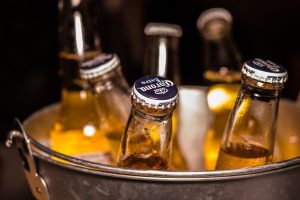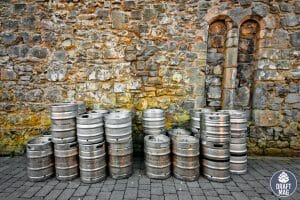Drinking Expired Beer: Here Are the Ins and Out of an Old Beer Bottle

Drinking expired beer: is it safe? If you ever stumble upon an old bottle of beer or expired beer can, there’s a chance you might have wondered this.
All beer lovers know that throwing away a whole bottle of beer is painful. Hence, with extensive research and our experiments, we have discovered everything you need to know about drinking expired beer.
Does Beer Really Expire?
Just like most edibles and beverages, beer too comes with an expiry date. Although they are chemically processed, the chief ingredients include organic, plant-based items that decay over time owing to bacterial growth and chemical reactions.
No matter how skilled the brewer is, they can only delay the expiry but never entirely stop it.
The government imposes to put accurate expiry dates on the bottles to ensure public health safety and responsible drinking. Brewers also put up the “Best Before” date to ensure that their customers only get quality and tasteful beer.
What Is the Shelf Life of a Beer?
The exact beer shelf life depends on the quality of production, composition, brewer’s expertise, and storage method.
On average, sealed beers are known to have a shelf life of six to eight months without refrigeration and up to 12 months with proper refrigeration. The lifespan of open or unsealed beer is naturally very short and will only last up to two or three days.
Can You Drink Expired Beer?
Here comes the main question, can you drink expired beer? Well, it depends.
– Pasteurized Beer
Drinking pasteurized expired beer is totally safe. During pasteurization, the beer bottles and cans are subjected to hot water spray at 140 degrees Fahrenheit, which kills and inhibits the growth of bacteria. At the most, you might experience loose bowels, but the beer does not turn toxic.
The taste of the beer is, however, a whole different story. Once it’s past the expiry date, it can taste a little flat and smell funny. Apart from the stale taste, there is nothing much to worry about.
– Unpasteurized Beer
If you drink expired beer that is unpasteurized, you can get really sick. The reason is that unpasteurized beer is not processed or filtered to inhibit bacterial growth, making it unsafe once the organic decay of the natural constituents starts.
The good news is most commercial brewers only sell pasteurized beer to improve the longevity of their product; but a few brewers might avoid pasteurization to retain the freshness and original taste of the beer. Hence, you need to check with the seller first or read carefully through the product description to know if you can actually drink the expired beer.
How To Know if Your Beer Has Gone Bad
Sometimes, beer can go bad even before the official expiry date if it is not stored properly. In this case, you need to be able to identify the difference between fresh beer and stale beer. Here are a few ways to tell if your beer has gone bad:
– Pay Attention to the Noise It Makes When You Open It
Just like most carbonated drinks, beer makes a hissing noise when you open the bottle or can. If you hear no such noise when you open the bottle, it’s a sign that the drink has lost carbonation.
Carbonation is the process of adding compressed carbon dioxide to beverages. It is visible as tiny white sparks rising to the surface as soon as you break the seal. It is used to preserve the drink and give it a signature tangy taste. In the absence of carbonation, your drink is no longer as good as new.
– No Foam
One of the classic features of beer that sets it apart from other alcoholic drinks is the formation of foam when poured into the glass. The frothy foam indicates the presence of carbon dioxide.
If your beer remains still and does not foam up when you crack open the seal and pour it out, it’s undoubtedly gone bad. You can obviously still drink it if it’s pasteurized, but it will certainly not taste good.
– Hold It Up Against Light
To identify old beer, you should hold up the bottle against light to see if there is any sediment at the bottom. Sediments are a sign of yeast reaction, which means your brew is well past the beer expiration date.
However, there is an exception to this rule. Certain styles of brewing beer like the German Weissbier or Belgian Dubbel do not consider sediments from a yeast reaction as a defect. So, if you are drinking these beers, this test will not work for you.
– Check for Leaks

If you have found a really old bottle sitting on the shelf for a long time, it’s a good idea to check for leaks. Although it might not be past the expiry date, the beer inside will definitely be stale if it has leaks.
Direct exposure to atmospheric oxygen will increase the oxidation of constituting ingredients and make them decay faster.
– Check the Taste and Smell
The best way to identify out of date beer is by checking its taste and smell. Old beer is typically accompanied by a skunky smell that is highly repulsive.
The beer will taste flat and stale, resemble a little like sewage water, and have an unbearably sour taste. This is obviously the last and the biggest sign of old beer, and you will probably want to avoid drinking it.
Why Does Beer Go Bad?
No one wants their beer to go bad. In this case, storing it properly is the only option to increase its longevity. To store it well, you need to understand the factors that cause beers to go bad:
– Exposure to Oxygen
Oxygen and your beer do not really get along. Exposure to oxygen leads to a chemical reaction between this highly reactive gas and the natural constituents of your beer. This results in the decomposition of original ingredients into a final product that does no good for your beer.
In dark beer, oxidation will convert the malty flavors into the foul taste of rotten fruits, and in a light beer, oxidation can make your beer taste very bland.
– Exposure to Sun Rays
The sunlight is the biggest enemy of all the hop-derived compounds in your beer and makes it smell skunky. When the UV rays from the sun come in direct contact with the hop-derived constituents in your beer, it causes it to decompose and mix with a sulfur-based compound.
This new mixture makes your beer go rancid and smell like skunk. The taste also deteriorates and resembles soggy, wet paper.
It’s important to note that not all beers have the same amount of hop-derived elements in their constitution. The higher the concentration, the higher the chances of your beer going bad. The worst part is that it only takes a few seconds of exposure to sun rays for your hop-derived compounds to begin decomposition.
– Bacterial Decay
Bacterial attack and decay are not a common cause of your beer going bad, mostly because commercial beers are pasteurized and resistant to bacterial attack and the alcohol content of beer makes it difficult for them to survive.
However, in case your beer is infected with bacteria or yeast, it will surely begin to decay. There is no way other than proper storing to prevent a bacterial attack.
Other Minor Factors That Can Make Your Beer Go Bad
Now that we know the fundamental causes that can spoil your beer let’s find out what are some other causes derived from these fundamental factors that can ruin your beer.
– Transportation
Poor and long transportation can also spoil your beer. If it’s agitated too much during the journey, the carbonated bubbles will rise to the lid and can even make the bottle explode. Sometimes during transportation, the crates of beer bottles and cans can unnecessarily heat up, triggering a decomposition chemical reaction among the ingredients.
– Poor Packaging
The packaging of your beer also plays a major role in deciding its longevity. It is always recommended to store beer in aluminum cans to maintain its freshness and keep the flavors intact.
If you want to go for bottles, make sure you pick the ones in brown and green. Both of these colors offer substantial protection against harsh UV rays and prevent decomposition. The white or clear glass bottles have zero resistance against sunlight and should be avoided at all costs.
How To Store Your Beer
The way you store your beer after purchase also determines how long it lasts. Here are a few things you need to keep in mind while storing your beer post-purchase.
– Refrigeration
It’s no secret that chilled beer tastes way better. Along with the taste, refrigeration also helps you preserve the beer for longer by keeping the temperature under check. It also protects your beer from direct sunlight, which could trigger a decomposition reaction among the ingredients.
– Proper Sealing
Never compromise with the seal of your beer. Ensure it’s tightly sealed when you buy it from the shop, and keep it that way if you don’t intend to drink it anytime soon. Opened beers are subjected to decay and decomposition faster than sealed beer.
– Store It in a Dark Place
If you are refrigerating your beer, it’s already being stored in a dark place. Even so, make sure you don’t place it in a room that receives a lot of sunlight. We recommend that you store it in cold and dark places like your basement, especially if you plan to preserve it for a few months.
Also, make sure that whatever room you choose should not have frequent temperature fluctuations. It will not only hamper the refrigerating system but can also accelerate the decay of your beer if it’s not refrigerated.
– Position It Upright

One of the most common mistakes that amateurs make is allowing the bottle to lie on its side. When you do so, you are exposing a larger surface area to potential oxidation.
However, if you position it upright, only a small surface area at the top of the bottle will be subjected to oxidation.
FAQ
Can you get food poisoning from expired beer?
Yes, expired beer can cause food poisoning due to the growth of bacteria. It’s best to discard beer past its expiration date.
Will old beer get you drunk?
Old beer may still contain alcohol, but it may taste unpleasant or have a lower alcohol content. However, it’s not recommended to consume expired beverages.
Does beer expire if unopened?
Yes, beer can expire even if it’s unopened. The expiration date on the beer bottle or can refers to the period beyond which the flavor and quality of the beer may degrade. However, the expiration date is just a rough estimate and the actual shelf life of the beer can vary depending on several factors such as storage conditions and beer style.
Final Thoughts
You can safely drink expired beer even after its expiry date. However, as a true fan of beer, you might not enjoy the bland taste. That’s why we always recommend you follow these storage guidelines to get the most of your money.
Disclaimer: none of the authors, contributors, administrators, vandals, or anyone else connected with draftmag.com, in any way whatsoever, can be responsible for your use of the information contained in or linked from this web page. Use at your own risk!






